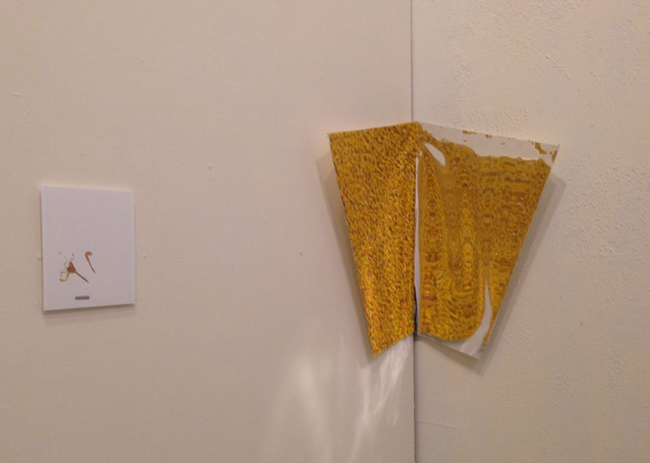VISUAL ARTS REVIEW by Alec Clayton for OLY ARTS
Salon Refu owner Susan Christion posted this on Facebook: “I have an art gallery, Salon Refu. This evening we finished installing a quiet, enticing, initially mysterious show of works by Shaw Osha, my friend and an important artist. Sometimes I don’t understand what Shaw is doing in her work as an artist. Right now I do understand it. It’s beautiful, thoughtful, compelled by feeling. You should come in and see what happens inside of you.”
Osha is a painter and visual arts professor at The Evergreen State College, known for her earlier figurative paintings in an abstract-expressionist style–works somewhat reminiscent of Richard Diebenkorn’s early figurative works–and more recently for conceptual work.
The work she’s showing at Salon Refu currently is a radical departure from earlier work. It is a group of collages with dried flowers and a theme of racial relations that is not at all made clear in the work itself, the only hint being one piece that has collaged onto it words cut from a newspaper: “who is white” and “who is black.”
The artist said that years ago she found an old diary from an ancestor who was a slave owner. There were cut flowers in the album. It seems since finding that album she has been obsessed with issues of black and white and with cut flowers–the flowers perhaps serving as metaphors for human lives cut down, glued onto pages and left as fading memories. Beyond this metaphor, which is my interpretation and not necessarily what Osha meant, there is no clear meaning in any of the works in this show.
The works are small, and they’re widely spaced on the gallery walls with some hung from the ceiling, behind windows or on sculpture stands. They consist of dried flowers pasted onto board, paper or shiny, reflective Mylar. The mirror quality of the Mylar brings into play another possible metaphor, the way we see ourselves and each other, and the manner in which we reflect one another. Some of the pieces with Mylar are hung in corners, and one is set on a sculpture stand. One corner piece has a sheet completely filled with tiny yellow flowers, a solid bed of these overlapping flowers, which is reflected in the Mylar she folded at a 90-degree angle in the corner. Depending on the viewer’s position, the reflection might completely fill the other side, or it might look like the flowers are pouring from one side onto the other while the first side remains full.
There are also quite a few pieces with words that hint at meaning without being explicit. Some of these are words cut from newspapers and collaged on, and some are created with many little dots made from fragments of cut flowers and arranged into letters. The words are almost impossible to see, and when one does see them they look at first glance like random design elements. Only gradually, then, do they become clear as letters. The complete words and sentences are almost impossible, if not absolutely impossible, to read. These become hidden messages for viewers to puzzle out.
One piece quite different from all the rest hangs inside one of the front windows. It’s a collage glued on the face of an old painting. I thought at first it was one of Osha’s older figurative paintings, but she informed me it was an old painting of a slave owner and slaves. There’s a man standing, another man seated casually in an office chair with rollers, and a standing woman wearing an apron. Collaged on top of this are an unreadable postcard and a bunch of dried flowers and stems.
This show is conceptual, not aesthetic. When art makes a statement, the meaning should not be too blatant, but neither should it be too obscure. Had Osha not explained her work reflects on her family history and questions black and white relationships, the meaning of her work might be completely lost, and that might negate it as meaningful art. On the other hand, there is the historical precedent of Marcel Duchamp’s “Fountain.” Had Duchamp not explained the meaning of that piece (essentially, a porcelain urinal) in a letter, it would have been completely lost to history.
What: Shaw Osha,
My Love Hath / Kissed in Fixing: New Terms and Herbarium Specimens
Where: Salon Refu,
114 Capitol Way N, Olympia
When: 2-6 p.m., Thursday – Sunday through Oct. 1
How much: free
Learn more: 360-280-3540 | Facebook.com/salonrefu

